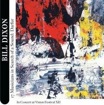
Bill Dixon Orchestra: 17 Musicians in Search of a Sound: Darfur (AUM Fidelity)
Few jazz innovators or heroes of the avant-garde are as little known beyond the cognoscenti as Dixon. An utterly distinctive trumpeter who pioneered the use of extremely non-standard timbres on his instrument, he is also an improviser and composer of boundless imagination who applied that adventurous deployment of timbres to works of uncompromising artistry with a painterly sense of color and abstraction unlike anyone else's jazz.
In the early 1960s he led the October Revolution in Jazz, a groundbreaking avant-jazz festival, and co-founded the subsequent cooperative Jazz Composers Guild. A few years later he started the Free Conservatory of the University of the Streets, a youth education program in Manhattan, and soon made the move to academia at Bennington College, where he eventually founded the Black Music department; by the time he retired from teaching in 1996, he had tutored many up-and-coming jazzers, including a few on the present CD.
When an artist of the stature of Dixon puts together a special project, many of the best players in the area are happy to make themselves available, so it's not surprising that the membership for this occasion was nearly all-star caliber: Graham Haynes, Stephen Haynes, and Taylor Ho Bynum on cornets/flugelhorns; trombonists Dick Griffin and Steve Swell; tuba player Joe Daley; bassoonist Karen Borca; bass clarinetist Will Connell; Michel Cote on B-flat contrabass clarinet; Andrew Raffo Dewar on soprano sax; John Hagen doubling tenor and baritone saxes; J.D. Parren doubling bass sax and bamboo flute; bassist Andrew Lafkas and cellist Glynis Loman; Jackson Krall on drums and percussion and Warren Smith on vibraphone, tympani, and drums. That array of instruments, especially in the hands of such fine players, allows Dixon even more creative options than usual, and the Gil Evans of the avant-garde takes full advantage. He does so with a perfectly judged balance of sound and space; rarely is the whole band playing all at once.
By the way, I remain amazed at the clarity of AUM Fidelity's recordings from the Vision Festival sound, because anyone who's attended has experienced the atrocious acoustics at the Angel Orensanz Foundation Center for the Arts, a converted synagogue where amplified music sounds boomy and muddy. That Stefan Heger worked this magic with a big band is even more impressive.
While listeners turned off by (occasional) atonality, dissonance, and a lack of harmonic/melodic structure will consider this random gibberish and run from the room with their hands over their ears, this probing, kaleidoscopic performance is anything but unstructured and, for lovers of avant-garde jazz, will possibly rank as the most thrilling release of the year. For that matter, this is music that transcends category, deserving an audience beyond the sphere of jazz, so fans of avant-garde classical may also find much to enjoy on this intense 57-minute CD.
